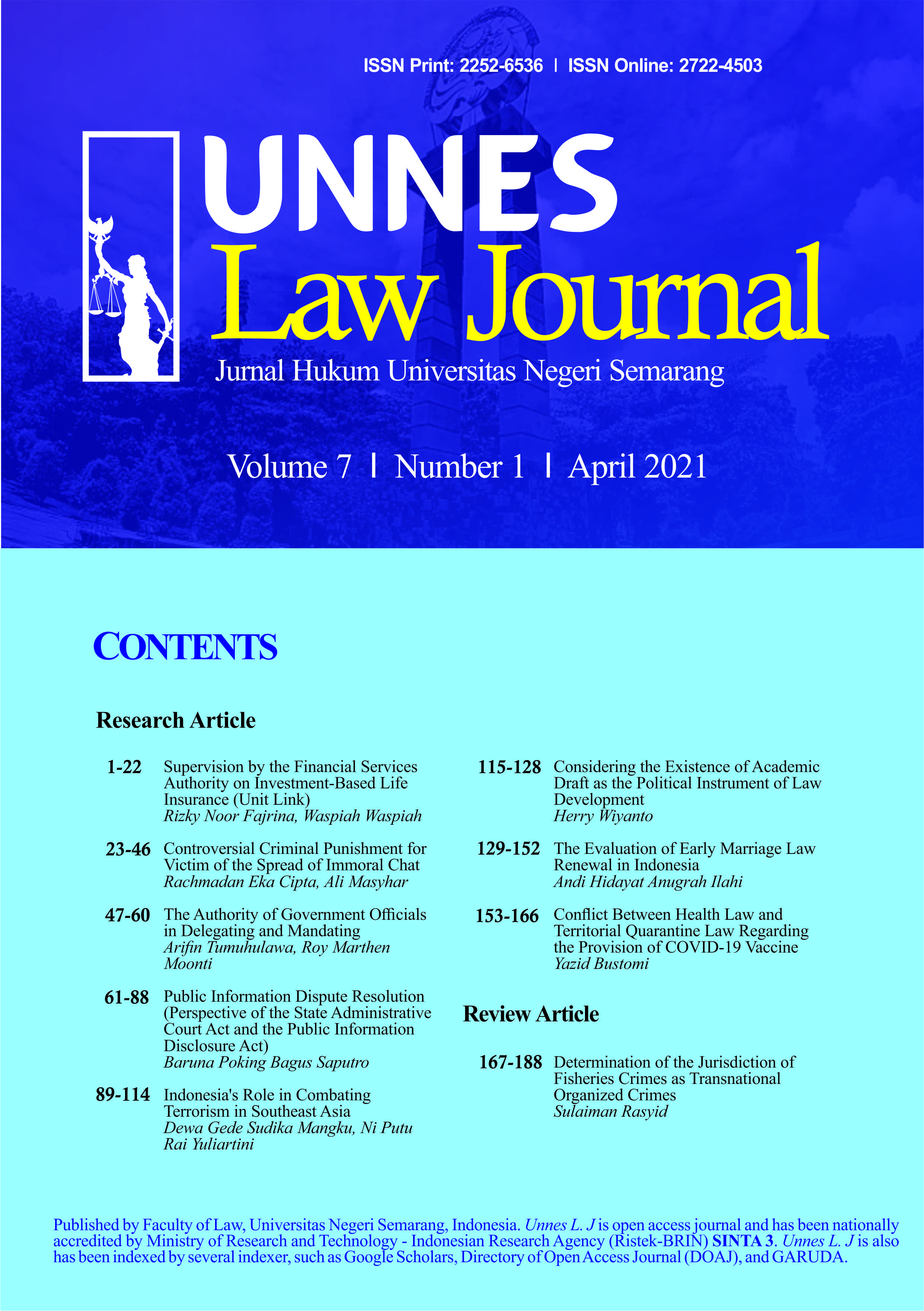Determination of the Jurisdiction of Fisheries Crimes as Transnational Organized Crimes International Law, Law of the Seas
Main Article Content
Abstract
The abundance of fisheries resources in Indonesian waters has made Indonesia a target of crime in the field of fisheries, this has an impact on the welfare and prosperity of the Indonesian people, especially local fishermen, the government continues to push this fisheries crime to be recognized as a type of organized transnational crime. This study aims to find out and analyze how Fisheries Crime Arrangements and the Determination of Fisheries Crime Jurisdictions are based on the provisions of organized transnational crime conventions. The research method used in this research is Normative Law Research with a legal approach, conceptual approach. And use the theory of determining the location of the crime (Locus delicti) in determining the jurisdiction of fisheries crimes. Research results show that (1) Regulations related to Fisheries Crimes both materially and formally in Indonesian law have been regulated according to the perspective of organized transnational crime, however, current fisheries laws do not cover all existing fisheries crimes. (2) in the case of determining the jurisdiction of fisheries crimes occurring in the territory of a country involving several state parties, the states parties must establish a joint investigation body. The conclusion of this research is that the laws and regulations owned by Indonesia related to Fisheries Crimes do not cover all aspects of crimes occurring in the field of fisheries and related to the determination of the jurisdiction of fisheries crimes the Indonesian government has implemented its jurisdiction based on the provisions of transnational organized crime conventions by cooperating with state parties the other.
Article Details
References
Kusumaatmadja, M., & Agoes, E. R. (2015). Pengantar Hukum Internasional, Bandung: P.T. Alumni.
Mauna, B. (2013). Hukum Internasional Pengertian, Peranan dan Fungsi dalam Era Dinamika Global. Bandung: P.T Alumni.
Muhamad, S. V. (2012). Illegal Fishing Di Perairan Indonesia: Permasalahan dan Upaya Penanganannya Secara Bilateral Di Kawasan. Jurnal Politica 3(1), 59-85.
Muhammad, A. (2004). Hukum dan Penelitian Hukum, Bandung: Citra Aditya Bakti.
Siombo, M. R. (2010). Hukum Perikanan Nasional dan Internasional. Jakarta: PT. Gramedia Pustaka Utama.
Soekanto, S., & Mamudji, S. (2009). Penelitian Hukum Normatif Suatu Tinjauan Singkat, Jakarta: PT Raja Grafindo Persada.
Sudarto, S. (2009). Hukum Pidana I Edisi Revisi. Semarang: Yayasan Sudarto Fakultas Hukum UNDIP Semarang.
Sugiyono, S. (2018). Metode Penelitian Kuantitatif Kualitatif dan R & D. Bandung: Alfabeta.
Supriadi, S., & Alimudin, A. (2011). Hukum Perikanan di Indonesia, Jakarta: Sinar Grafika.
Tasyrif, Y. (2000). Peraturan Perluasann Yurisdiksi Pidana Di Suatu Wilayah Negara. Jurnal Hukum & Pembangunan 30(1), 7-19.
Tunggal, A. J. (2013). Pengantar Hukum Laut. Jakarta: Harvarindo.
Laws and Regulation
United Nations Convention on the Law of the Sea (UNCLOS) of 1982.
Undang-undang Republik Indonesia No. 17 Tahun 1985 Tentang Pengesahan United Nations Convention on The Law of The Sea.
United Nations Convention Against Transnational Organized Crime (UNTOC) of 2000.
Undang-undang Republik Indonesia No.5 Tahun 2009 Tentang Pengesahan United Nations Convention Against Transnational Organized Crime.
